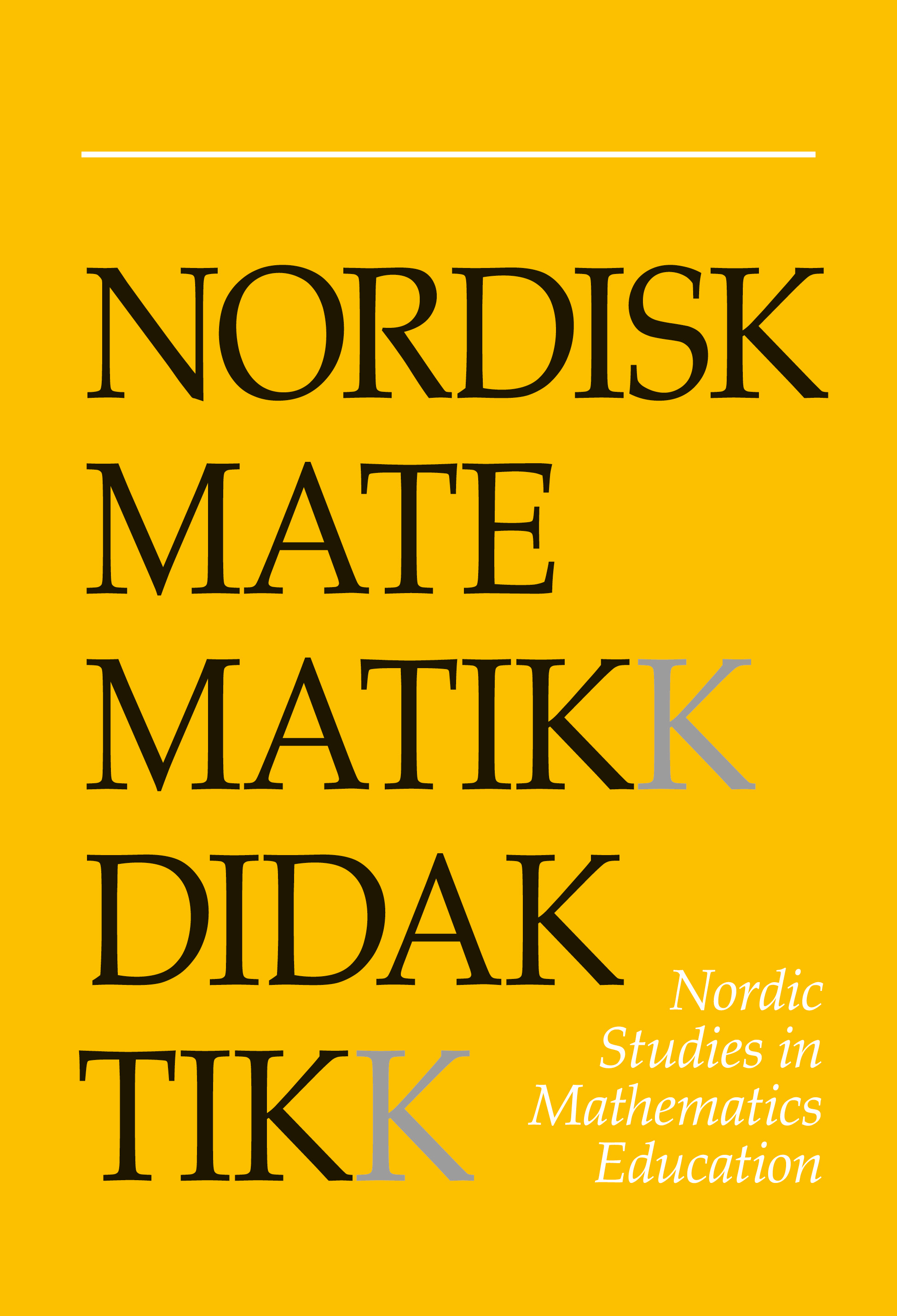Opportunities to learn ambitious mathematics teaching from co-planning instruction
DOI:
https://doi.org/10.7146/nomad.v26i3-4.149170Abstract
This study explores ambitious teaching practices teachers have opportunities to learn when co-planning instruction as part of their professional development. An analytical framework associated with Sociocultural discourse analysis is applied to identify utterances (dialogue moves) in the co-planning sessions that are essential in helping the teachers to develop their reasoning together. The findings reveal that the participants work on the ambitious practices of predicting student responses, representing these responses and aiming towards the goal for the lesson when co-planning to introduce the distributive property of multiplication to their students. Dialogue moves in the reasoned dialogues such as expressing shared ideas and agreements, providing arguments and challenging each other’s ideas are found to be essential for providing the teachers with opportunities to learn to predict student responses, to represent these responses and to aim towards the learning goal for the lesson.
References
Ambrose, R., Baek, J. M. & Carpenter, T. (2003). Children's invention of multidigit multiplication and division algorithms. In A. J. Baroody & A. Dowker (Eds.), The development of arithmetic concepts and skills: constructing adaptive expertise (pp. 305-336). Lawrence Erlbaum.
Barmby, P., Harries, T., Higgins, S. & Suggate, J. (2009). The array representation and primary children's understanding and reasoning in multiplication. Educational Studies in Mathematics, 70 (3), 217-241. https://doi.org/10.1007/s10649-008-9145-1
Carpenter, T., Levi, L., Franke, M. L. & Koehler, J. (2005). Algebra in elementary school: developing relational thinking. ZDM, 37 (1), 53-59. https://doi.org/10.1007/BF02655897
Fauskanger, J. & Bjuland, R. (2019). Learning ambitious teaching of multiplicative properties through a cycle of enactment and investigation. Mathematics Teacher Education and Development Journal, 21 (1), 125-144.
Ghousseini, H., Beasley, H. & Lord, S. (2015). Investigating the potential of guided practice with an enactment tool for supporting adaptive performance. Journal of the Learning Sciences, 24 (3), 461-497. https://doi.org/10.1080/10508406.2015.1057339
Goldsmith, L. T., Doerr, H. M. & Lewis, C. C. (2014). Mathematics teachers' learning: a conceptual framework and synthesis of research. Journal of Mathematics Teacher Education, 17 (1), 5-36. https://doi.org/10.1007/s10857-013-9245-4
Grossman, P., Kavanagh, S. S. & Dean, C. G. P. (2018). The turn towards practice in teacher education. In P. Grossman (Ed.), Teaching core practices in teacher education (pp. 1-14). Harvard Education Press.
Horn, I. S. (2005). Learning on the job: a situated account of teacher learning in high school mathematics departments. Cognition and Instruction, 23 (2), 207-236. https://doi.org/10.1207/s1532690xci2302_2
Horn, I. S. (2010). Teaching replays, teaching rehearsals, and re-visions of practice: learning from colleagues in a mathematics teacher community. Teachers College Record, 112, 225-259. https://doi.org/10.1177/016146811011200109
Horn, I. S. & Kane, B. D. (2015). Opportunities for professional learning in mathematics teacher workgroup conversations: relationships to instructional expertise. Journal of the Learning Sciences, 24 (3), 373-418. https://doi.org/10.1080/10508406.2015.1034865
Izsák, A. (2004). Teaching and learning two-digit multiplication: coordinating analyses of classroom practices and individual student learning. Mathematical Thinking & Learning, 6 (1), 37-79. https://doi.org/10.1207/s15327833mtl0601_3
Kavanagh, S. S., Metz, M., Hauser, M., Fogo, B., Taylor, M. W. & Carlson, J. (2020). Practicing responsiveness: using approximations of teaching to develop teachers' responsiveness to students' ideas. Journal of Teacher Education, 71 (1), 94-107. https://doi.org/10.1177/0022487119841884
Kazemi, E. (2017). Teaching a mathematics methods course: understanding learning from a situative perspective. In S. Kastberg, A. Tyminski, A. Lischka & W. Sanchez (Eds.), Building support for scholarly practices in mathematics methods (pp. 49-65). Information Age.
Kazemi, E. & Hubbard, A. (2008). New directions for the design and study of professional development: attending to the coevolution of teachers' participation across contexts. Journal of Teacher Education, 59 (5), 428-441. https://doi.org/10.1177/0022487108324330
Kelly, A. V. (2009). The curriculum: theory and practice. Sage.
Larsson, K., Pettersson, K. & Andrews, P. (2017). Students' conceptualisations of multiplication as repeated addition or equal groups in relation to multi-digit and decimal numbers. The Journal of Mathematical Behavior, 48, 1-13. https://doi.org/10.1016/j.jmathb.2017.07.003
Lampert, M., Beasley, H., Ghousseini, H., Kazemi, E. & Franke, M. L. (2010). Using designed instructional activities to enable novices to manage ambitious mathematics teaching. In M. K. Stein & L. Kucan (Eds.), Instructional explanations in the disciplines (pp. 129-141). Springer. https://doi.org/10.1007/978-1-4419-0594-9_9
Lampert, M., Franke, M.L., Kazemi, E., Ghousseini, H., Turrou, A.C. et al. (2013). Keeping it complex: using rehearsals to support novice teacher learning of ambitious teaching. Journal of Teacher Education, 64 (3), 226-243. https://doi.org/10.1177/0022487112473837
Lave, J. (1991). Situating learning in communities of practice. In L. Resnick, J. Levine & S. Teasley (Eds.), Perspectives on socially shared cognition (pp. 63-82). APA. https://doi.org/10.1037/10096-003
Littleton, K. & Mercer, N. (2013). Interthinking: putting talk to work. Routledge. https://doi.org/10.4324/9780203809433
Munthe, E. & Conway, P. F. (2017). Evolution of research on teachers' planning: implications for teacher education. In D. J. Clandinin & J. Husu (Eds), The SAGE handbook of research on teacher education (pp. 836-852). SAGE. https://doi.org/10.4135/9781526402042.n48
Schumway, J. F. (2011). Number sense routines: building numerical literacy every day in grades K-3. Stenhouse.
Smylie, M. A. & Wenzel, S. A. (2006). Promoting instructional improvement: a strategic human resource management perspective. University of Chicago.
Utdanningsdirektoratet (2019). Læreplan i matematikk for 1.-10. trinn [Mathematics curriculum years 1-10]. https://www.udir.no/lk20/mat01-05
Verschaffel, L., Greer, B. & De Corte, E. (2007). Whole number concepts and operations. In F. K. Lester (Ed.), Second handbook of research on mathematics teaching and learning (pp. 557-628). Information Age.
Warwick, P., Vrikki, M., Vermunt, J. D, Mercer, N. & Halem, N. van (2016). Connecting observations of student and teacher learning: an examination of dialogic processes in Lesson Study discussions in mathematics. ZDM, 48 (4), 555-569. https://doi.org/10.1007/s11858-015-0750-z
Wæge, K. & Fauskanger, J. (2020, online first). Teacher time outs in rehearsals: in-service teachers learning ambitious mathematics teaching practices. Journal of Mathematics Teacher Education. https://doi.org/10.1007/s10857-020-09474-0
Downloads
Published
How to Cite
Issue
Section
License

This work is licensed under a Creative Commons Attribution-NonCommercial-ShareAlike 4.0 International License.



